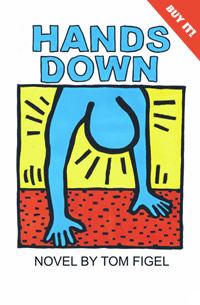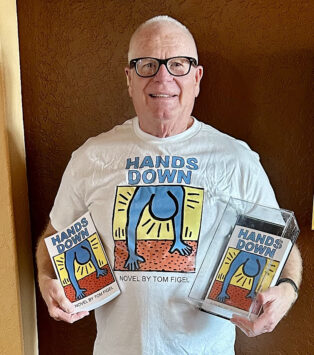
Self-publishing, I’ve learned, includes an opportunity to purchase reviews: only a review, not the opinion in the review. Both reviews – one positive, one not – seem imprecise because of the limited time a practical person can give to such part-time work. – Tom Figel
From Publishers Weekly:
Set among Iowa’s vividly evoked “flat farms and lines of windbreak trees” and “corn-rich fields and warm grassy smells,” Figel’s rangy, engaging 1960s-set debut novel centers on an ambitious Hawkeye named Dennis Spuhn, a young Marine fresh out of Vietnam and determined to open his own restaurant chain in his home state, but boasts an expansive cast of compelling local color. That includes a high-school wrestling champion turned holy man with divine healing powers; an artist desperate to escape her sister’s shadow; a copy editor discovering her ill health; and a womanizing vagabond with a penchant for traveling on his hands. Remarkably, Figel’s pleasantly paced story connects the lot of them, tying everything together by the time the story reaches its final pages—and the Missouri River dividing Iowa from Nebraska.
Hands Down pairs its story of coming-of-age in a time of societal upheaval with a series of character-rich vignettes worthy of Donald Harrington, all with a healthy dose of history thrown in as the tale unspools. As the war in Vietnam escalates, a group of draft dodgers has taken up residence on the outskirts of a small Iowa town; local politics complicate everything, of course, as does a bullying powerhouse of a lawyer and a developer’s plan for “small and shabby” housing.
Figel’s style is fast-paced and to the point, though the point, here, is usually his desire to catch the full blush of a moment, the drift of characters’ minds, the comic tenor of their talk, the ways things truly work, and how the sky on a sunny afternoon eventually yields a “great horizon of pink and orange.” Those moments and characters are the key to this journey of a novel, as Figel, adept at arcs and human surprises, brings rare empathy and understanding to the trials and triumphs of his people. The connections between them, when revealed, may elicit a-ha!s from readers.
Takeaway: This vivid novel of Iowa in the tumultuous 1960s bursts with empathy and character.
Great for fans of: Ken Babbs’s Cronies, Donald Harington.
Takeaway: This vivid novel of Iowa in the tumultuous 1960s bursts with empathy and character.
Great for fans of: Ken Babbs’s Cronies, Donald Harington.
Production grades
Cover: B
Design and typography: A
Illustrations: N/A
Editing: A-
Marketing copy: B
From Kirkus Reviews
Figel blends a coming-of-age story with social satire in a debut novel about the seemingly inevitable achievements of a
young soldier-turned–restaurant owner.
It’s 1964, and Dennis Spuhn, a former popular kid in high school and Marine Corps enlistee, totes a copy of Napoleon Hill’s Think and Grow Rich (1937) as part of an effort to manifest entrepreneurial success. Figel’s novel follows his ascent from a student at St. Sebastian’s parochial school to a successful Iowa restaurateur. The novel includes a broad, diverse, and eclectic supporting cast of characters that help Spuhn along the way, including the members of a moneyed Cuban American family from Miami who offer him business advice and partnership, a construction company owner who serves as a mentor, and daring pal Ronnie Tonti, who halts traffic by walking on his hands across a toll bridge. Given the size of its cast, it would seem that the story of Spuhn’s rise would be a complicated one. However, readers will rarely feel uncertain about his future success, as the only person in his way seems to be feckless, conservative political climber and former high school rival Greg Benson, whose jealously of Spuhn is never fully developed. Indeed, Benson remains a caricature: a nerdy freshman–turned–“distorted” bodybuilder and horrible restaurant patron. As a result, there’s never any plausible stakes to Spuhn’s story. Even his military service in Vietnam seems oddly sanitized and left off-page; at one point, he’s shown to be eager to extend his time at war, as if nothing—not even disastrous military conflict—can get in his way. Yet his time overseas is only present in allusions, as if it were just another stop on his road to wealth.
An ambitious but ultimately undramatic tale of one man’s rise.

Friends’ Opinions:
You will never think of Iowa the same again, after you pounce through it with a cadre of bizzaro characters that include a local wrestling star who turns evil, and then turns faith healer; a women-addicted Cajun who walks across the entire state — on his hands; and a doughty, ex-Marine whose name sounds like an eating utensil and who wants to open — what else?— a string of restaurants.
The pace is turbo-charged with somebody new factoring in at almost every chapter, enjoyably leading the reader to continuously ponder a matrix of conceivable outcomes. Set against the already turbulent late 1960’s and early ‘70s, the players all pile up up for a multi-layered finish.When you read HANDS DOWN, you will realize why the Boomers really did mess up everything (even in Iowa), and why they also relished a helluva lot of self-amusing “fun” doing it.
– W.H. Giles
“Hands Down” is an ambitious first novel by author Tom Figel, exploring the zeitgeist of 60’s and 70’s Americana with a Tom Robbins like flair for the imaginative yet oddly plausible. His carefully drawn characters are a group of small town friends that span the cultural landscape from Vietnam war veterans to anti-war activists, dropouts to business skyrockets with pop culture, young love and adult angst woven around the unlikely image of a New Orleans exile crossing Iowa on his hands! The story challenges nostalgic throwbacks with thoughtful character study and a wonderful sense of humor that is “hands down” to win you over!
– Don Hynes, poet, “The Irish Girl”
Tom, I have finished “Hands Down!” While it was not in the genre of my usual reading habits ( ie: Tom Clancy, Lee Child, Stephen Coonts, Clive Cussler, David Hagberg, W.E.B Griffin), I found it to be a great read. I guess part of what appealed to me was the era that it takes place in as well as the smaller town aspect, having grown up in Fargo, ND. (The other ND in my life). I could totally relate to having to deal with a character like Greg Benson-I’m sure we have all had one of “them” in our life. I was hoping for a happy ending for Dennis and Jenny, but I guess this gives you an excellent opportunity for a sequel!
– Paul Eide, Notre Dame classmate
I have needed some time to adjust to the ending of “Hands Down”. I thoroughly enjoyed reading and getting to know the characters with their various strengths and flaws. However, as I finished the final page, I kept clicking on my Kindle edition, assuming that there must be more to this. It reminded me of what Marie Antoinette surely thought as she faced the guillotine: “I’ve had a great life up until this point!” I want to know what the fuck happened to all these people. I need denouement! I need comeuppance! I don’t need things spelled out specifically ala American Graffiti, but the reader is left with nothing. Is this a fiendishly clever cliffhanger to promote the sophomore (not sophomoric) effort? I hope so.
My mood soured to the point that I identified with the Menendez parents being somewhat disappointed with the twins’ final actions.
That said, I totally enjoyed your work. Every other page made me wonder where something came from or how did you know about these things. In
addition, you certainly can turn a phrase.
Just in, CNN reported that it has deciphered one of the redactions in the very recently released Mar-a-Lago affidavit. The only item that the
FBI left behind was a copy of your novel.
– Mike Townsend, Assumption High School classmate

(“A big family helps sales.” –TF)
Hands Down, Mark Twain Would Have Appreciated This Work
Put down that angst-driven novel with its big city dramas and take an enjoyable trip back in time with Hands Down. It’s first and foremost, a great story, with its wealth of characters roaming through finely detailed landscapes to create a truly lived-in tableau of Middle America as it evolved from an innocent early 1960s to a more sinister, corporate-fueled 1970s. Iowa, cradled between the Mississippi River on its east and the Missouri on its west, is the setting for most of the novel. Far from a heavenly field of dreams, but oh so very American, the story will especially appeal to veterans, wrestlers, gymnasts, anyone who was a teenager when JFK was shot, and all those who remember the thrill of finding oneself far from home in a time before cell phones.
Among the many likable characters here, you’ll first meet an Army grunt on the lam from his brutish New Orleans brother, a recovering Russian alcoholic, and a Quad City Marine. They and their mates will evolve in different directions, their paths crisscrossing over the course of a decade whose turbulence might not have been as photogenic as portrayed in Chicago, New York or Los Angeles, but whose ripple effects were profound nonetheless. The Marine eventually opens a chain of restaurants and hires the Army grunt to publicize their arrival by embarking on an epic trek across the Hawkeye State. Walking on his hands? Yup, walking on his hands.
Why Hawkeye? Most historians say the name arose as an homage to The Last of the Mohicans and the Revolutionary America that the good farm folk left behind. The Iowa that Tom Figel recreates here seems to me to be located midway between our beginnings and our present precarious state. There are no riverboats or runaway slaves, but there are plenty of desperate people far from home occupying an America Mark Twain would have recognized.
– Joe Enright, author, forthcoming novel Blizzard Warning
Great Book. I read 40 books a year. Best book since Where the Crawdads Sing. Keep writing.
– Tom Phillips, Notre Dame classmate
Hi Tom,
I finished ‘Hands Down’ and am once again standing straight up. That was quite an effort and for someone who hasn’t spent too much time in Iowa, it was quite informative since I was always under the impression that all cornstalks were alike.
I was a bit surprised that you did not include James A. Michener in your list of admired authors. Many of your descriptions reminded me of him.
Let me say ‘Hands Down’ is a very good read; however, I did have to google some of the words because of your magnificent vocabulary. Since I’m not as smart as the average bear, I needed to makes notes to keep the rather complex character relationships straight. Don’t take that as a criticism. I sense that your target reading audience is one that enjoys connecting dangling nuances into an insightful vista. Personally, I’m barely beyond ‘Peanuts’ and ‘Beatle Bailey’ and sometimes struggle to know ‘Who’s on first.’
I was absolutely delighted by the reference to Red Man chewing tobacco signage on page 63. My dad was a Red Man chewing tobacco salesman for about 20 years. One day when I was either 9 or 10, he took me on a day trip to a dairy farm in New Jersey where dad had to replace a weather beaten Red Man sign on the side of a barn with a new one. I was too young to remember the scale of everything but dad had a big ladder and a stapling gun that I still have. When the work was finished, the farmer gave us a tour of the cow barn and had me stick my finger into one of the milking suction cups – very weird for an intercity kid. Today he would probably end up on a pedophilia watch list.
One thought that distracted me as I began to read your book was the reference to C130s as the paratrooper training planes at Fort Benning. When I was at Benning in 1968, the training planes were C119, ‘Boxcars.’ If I understand the book’s timeline, your characters were heading to Benning around 1966. At that time, I believe only the active airborne divisions, the 82nd and the 101st, were using the C130 Hercules.
Also, when Ronnie Tonti was discharged, he stuffed his paper work in his fatigue pocket and hand stand is way out. I’m pretty sure that it’s a military tradition to be dressed in your Class A’s for your separation ceremony, not your Class ‘C’ fatigues.
– Dan Collins, Notre Dame classmate, author of novels “Future Victories” and “Future Victories II”
I did read your book. I enjoyed it and loved the ending.
– Susan Brennan, St. Paul’s grade school classmate
Just finished the book and I really liked it. It pulled me along to the end. Some great characters! You did it, one James K. Flanagan would be proud.
– Tom Condon, former Notre Dame roommate, author, Connecticut journalist
I finished Hands Down, and posted reviews on both Amazon and Goodreads – took a very strange twist toward the end but it set up the ending perfectly. There was a stretch when I though there was too much detail, too much business, too many new people coming in – but it developed the pace and the character change in Spuhn which was so crucial after the attack. Bravo. If the next book is a continuing story of these folks – I was going to say SOLD but truth to tell, doesn’t matter – if the next book has your name on it as author – yeah, sold.
– Rev. John Sheehan, S.J., Notre Dame classmate
Where has this fellow been for the last 50 years ?
Not a good read, a great one.
– Jay Schwartz, Notre Dame classmate (who had not read the novel yet)
